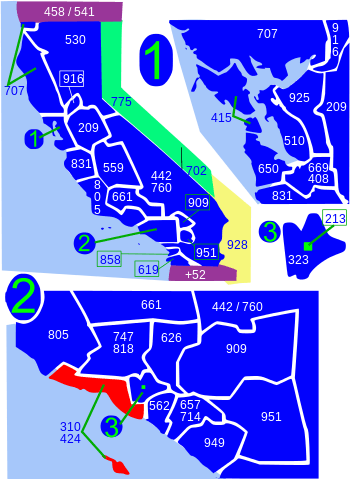Area codes 310 and 424

Area codes 310 and 424 are California telephone area codes that cover the West Los Angeles and South Bay areas of Los Angeles County, including Santa Catalina Island (located 26 miles (42 km) south of the mainland portion of Los Angeles County). It also includes a small portion of Ventura County.[1]
Area code 310 was created in a split from area code 213 on November 2, 1991. On January 25, 1997 area code 310 was split, creating area code 562 for the southeast portion of Los Angeles County and a portion of Orange County. Area code 424 serves as an overlay of 310 that became effective on July 26, 2006, the first overlay in California.[2]
List of cities and neighborhoods in the 310 and 424 area codes
Los Angeles County
- Alondra Park
- Athens
- Avalon
- Beverly Hills (small portion in the 323 area code)
- Carson
- Compton
- Culver City
- Del Aire
- East Compton
- El Segundo
- Gardena
- Hawthorne (small portion in the 323 area code)
- Hermosa Beach
- Inglewood (small portion in the 323 area code)
- Lynwood
- Ladera Heights (also in the 323 area code)
- Lawndale
- Lennox
- Lomita
- Los Angeles
- Lynwood (small portion in the 323 area code)
- Malibu
- Manhattan Beach
- Marina del Rey
- Palos Verdes Estates
- Rancho Palos Verdes
- Redondo Beach
- Rolling Hills Estates
- Rolling Hills
- Santa Monica
- South Gate (mostly in the 323 area code and small portion in the 562 area code)
- Topanga (small portion in the 818 area code)
- Torrance
- West Athens (mostly in the 323 area code)
- West Carson
- West Compton
- West Hollywood (also in the 323 area code)
- Westmont
- Willowbrook (also in the 323 area code)
Splits and overlay controversy
Area code 562 was originally destined to be an overlay code for cellular telephones and pagers for the existing 310 area, to go into service in late 1995, to be extended to overlay the 213 and 818 areas the following year.[3] However, the plans were changed to a simple split of 310, as the California Public Utilities Commission decided that overlay would have disadvantaged customers of smaller companies in requiring 10 digit dialling.[4]
The south and east portions of 310, roughly the Gateway Cities area of Los Angeles County from Long Beach to Whittier and parts of Orange County became area code 562 on January 25, 1997.
In lieu of executing an additional split, a new area code, the 424 overlay for the entire 310 region, was first announced in early 1999. Previously, several proposals had been made to split 310 at Imperial Highway, a major east-west thoroughfare that marks the southern boundary of Los Angeles International Airport. The South Bay below the boundary would have received area code 424. South Bay governments and businesses opposed such a move, since it would require costly changes to business cards, stationery, signage, and other business communications.
Announcement of the 424 overlay created an uproar in Los Angeles's politically powerful Westside community, in part because the change would necessitate dialing 10 digits even when calling local numbers. Championed by Los Angeles Times columnist Robert Scheer in the paper's Santa Monica insert section, a protest movement arose in May 1999, focusing on the idea of telephone-number conservation. In a carry-over from the analog phone-system days, numbers were still being distributed to telephone companies in blocks of 10,000, leading to a huge volume of unused telephone numbers in each area code. Responding to the controversy, the California Assembly passed the Consumer Area Code Relief Act of 1999 on September 9, 1999, and the 424 overlay was tabled.
Having been staved off nearly seven years, the 424 overlay was finally implemented on July 26, 2006, and new telephone numbers issued in the 310 area code may now begin with either 310 or 424. On December 31, 2005, customers began dialing 1 + area code + seven-digit number (cellphones can omit the "1") whenever a call is placed from the 310 area code. After July 26, 2006, customers were required to use the new dialing procedure for all calls.
See also
References
- ↑ "Archived copy". Archived from the original on 2009-04-11. Retrieved 2009-04-10.
- ↑ "310/424 Area Code Information". CPUC. Retrieved August 5, 2017.
- ↑ .
- ↑ .
External links
| California area codes: 209, 213, 310/424, 323, 408/669, 415/628, 442/760, 510, 530, 559, 562, 619, 626, 650, 657/714, 661, 707, 747/818, 805, 831, 858, 909, 916, 925, 949, 951 | ||
|---|---|---|
| North: 805, 747/818 | ||
| West: Pacific Ocean, 808 | area code 310/424 includes islands offshore | East: 323, 562 |
| South: Pacific Ocean | ||
| Hawaii area codes: 808 | ||